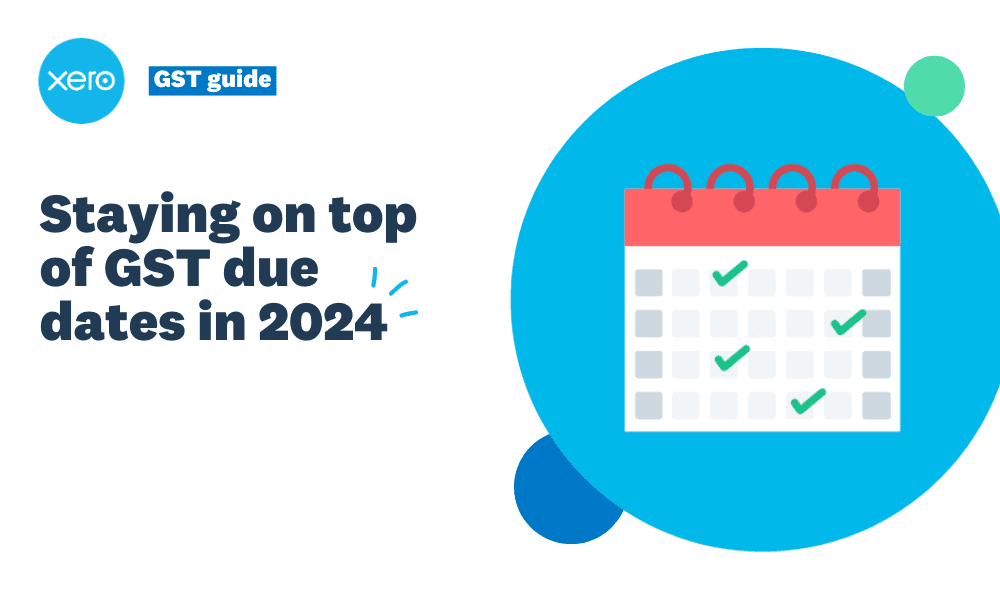
Staying on top of GST due dates in 2024

It can be tricky to keep tabs on the taxes and deductions you owe throughout the year as a small business. However, paying on time means getting peace of mind that you’re meeting your GST payment obligations as a business, and avoiding late penalties that cut into your earnings.
If your business is registered for GST, you’ll have a number of deadlines to meet during the new year to file and pay GST. These due dates depend on when you registered and the filing frequency of your business.
With the end of the financial year on the way, it’s a good time to look at GST due dates for the next year. We’ve put together the current GST due dates for 2024 and covered some common questions from business owners on filing and paying GST.
Pro tip: set reminders on your business calendar so you don’t forget these dates when things get busy!
How GST due dates work
All GST-registered businesses in New Zealand have deadlines for when they need to pay GST.
New Zealand’s Inland Revenue sets a GST due date for each month. These due dates will depend on when you first registered your business for GST, and the accounting basis and ‘filing frequency’ you chose at the time.
Find out how you can file GST and the information you need to do it.
What is the filing frequency for my business?
Your filing frequency determines whether you have monthly, two-monthly or six-monthly GST due dates.
Though anyone can choose the monthly option, there are other things to keep in mind when choosing the filing frequency of your business.
| Filing frequency | Criteria | Suitable if… |
| Monthly | – If your sales are over $24 million in any 12-month period (applies to GST groups as a whole) you must pay monthly – Anyone else can choose to file monthly if they like | You get GST refunds regularly |
| Two-monthly | If your sales are under $24 million in any 12-month period (applies to GST groups as a whole) | You want to keep on top of your business’ paperwork |
| Six-monthly | If your sales are under $500,000 in any 12-month period (applies to the group as a whole) | Your business has few sales and purchases |
Need to change your filing frequency? If your business situation has changed, and you’re eligible to change your filing frequency, you can do this through your myIR account.
GST payment and filing penalties
There are a few ways your business could receive a late penalty. Depending on the reason, the fines can be steep.
- Late filing: if you’re late to file your GST, the penalty is $50 if you’re on the payments basis, and $250 if you’re on the invoice or hybrid basis
- Late payments: if you’re late to pay the amount you owe by one day, you’ll receive a penalty charge of 1% of the GST amount owed. This increases to 4% of the total amount after 7 days, and 1% for every month after that
- Under-declaring: if you owe more GST than you’ve declared or paid, penalties can range from 20-150% of the amount you owe, depending on how serious the issue is
Thankfully, these penalties are easy to prevent. You can hold onto your cash and avoid the headache of missed deadlines by noting the relevant due dates for your business below.
GST due dates for 2024
| Taxable period ending | GST due date |
| 30 November 2023 | 15 January |
| 31 December 2023 | 29 January |
| 31 January 2024 | 28 February |
| 29 February 2024 | 28 March |
| 31 March 2024 | 07 May |
| 30 June 2024 | 29 July |
| 31 July 2024 | 28 August |
| 31 August 2024 | 30 September |
| 30 September 2024 | 28 October |
| 30 November 2024 | 15 January 2025 |
You can visit Inland Revenue for more information about filing GST.
Not registered for GST?
Not all businesses need to be GST registered in New Zealand. You only have to register your business for GST if:
- the annual turnover is more than $60,000 – until then, GST registration is voluntary only
- you’re charging GST on your goods or services
You might still want to register for GST, even if your business doesn’t meet the criteria above. That’s okay too.
Can I change my GST due dates?
Unfortunately, you can’t get an extension on the GST due dates for each month. So it’s extra important to make sure you file on time. The only exceptions to regular GST due dates are:
- for the taxable period ending 31 March, GST returns are due by 7 May
- for the taxable period ending 30 November, GST returns are due by 15 January
How can I make GST easier to manage?
To make life a little easier the next time your GST due date rolls around, you should:
- take note of the GST you collect on sales
- transfer money to a separate bank account to cover your GST payments
- keep and organise your receipts and invoices, so that it’s easy to claim GST on business expenses
- streamline your record keeping using Xero accounting software, Files, Hubdoc, or other solutions on the Xero App Store to submit GST returns
- work with an accountant or bookkeeper to avoid any nasty surprises
The information in this article should be used for general guidance only and you should seek appropriate tax, financial and legal advice as may be appropriate for your particular business needs.

